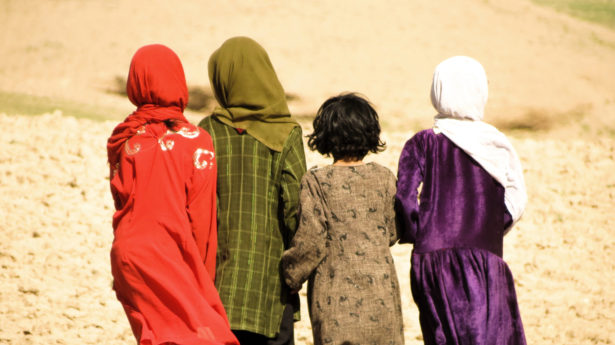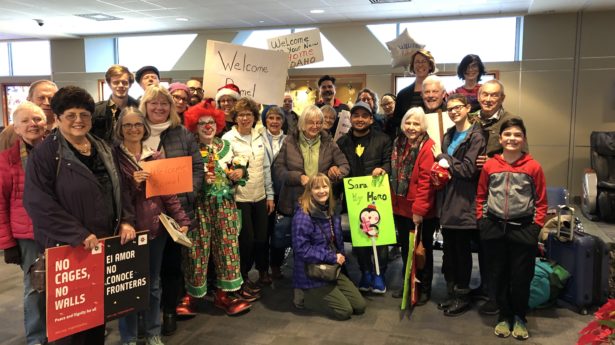The Unitarian Universalist Service Committee advances human rights through grassroots collaborations.
One Year After Withdrawal, Afghans Still Lack Secure Status

August 31, 2022
August 30 marks one full year since the last U.S. soldier left Afghanistan, ending a 20-year-long military occupation of the country. During those two decades, thousands of Afghan people put their lives at risk to help U.S. troops or serve in civilian roles with agencies working to rebuild Afghan society. With the end of the U.S. presence in the country, these individuals were suddenly at risk of assassination, imprisonment, and other reprisals from the Taliban, as it completed its violent recapture of the country.
In the chaotic final days of the U.S. withdrawal, the military evacuated some 85,000 of these Afghans to the United States. But no sooner had they reached temporary safety abroad than they confronted a new uncertainty: the lack of any secure path to permanent status in the United States. In the absence of such a path to legal residency, these Afghan evacuees are at risk of losing their jobs, health care, loved ones, and even their right to stay in the United States without fear of being deported into the hands of the Taliban.
Recognizing the urgency of their plight, a bill was recently introduced in Congress that seeks to rectify this injustice. The Afghan Adjustment Act (Senate Bill 4787 and House Bill 6585) would ensure for the first time that Afghans evacuated to the United States will have a path to permanent status in this country. This bipartisan, bicameral legislation will ensure that Afghan evacuees no longer have to fear deportation to the hands of the Taliban or loss of livelihood in the United States, and that they will finally be able to bring family members to safety who are currently stranded abroad.
This bill affects people like Abdul Wajed Ahadi, who served with the former Afghan Air Force in partnership with U.S. forces, and who has been separated for the past year from his wife and three children in Afghanistan. In the absence of a legal path to permanent residency, Afghans like Ahadi have no assurance they will be able to make a new home for themselves in the United States; nor can they reunite with their loved ones in Afghanistan. Worse still, they have to live in fear that their family members and children may face violent reprisals from the Taliban and other armed groups in Afghanistan, due to their family’s association with the U.S. war effort.
In the early days following the U.S. withdrawal, Americans of all political stripes supported bringing Afghan partners and allies to safety. Yet, after tens of thousands of Afghans set foot on U.S. soil, news media largely turned their attention away, and much of the public stopped thinking about them. Many assumed the evacuees were safe and had established a path to permanent status in the United States. But they were mistaken. In truth, the evacuees were left in legal limbo.
Most of the evacuated Afghans are living in the United States with a form of temporary status known as humanitarian parole—a status that expires after a maximum of two years. With humanitarian parole doomed to lapse, Afghan evacuees have limited options. They can enter the backlog for the Special Immigrant Visa (SIV) or asylum programs, but both involve years-long legal processes with uncertain outcomes. Moreover, many evacuated people lost crucial paperwork during the desperate exodus from Afghanistan, and this would compromise their ability to win their legal cases for either status.
While waiting for the final decision in these processes, many Afghan evacuees would lose their parole status, affecting their ability to live in the United States. Most would be forced to depend on the current Temporary Protected Status (TPS) designation for Afghanistan, which shields Afghan nationals from deportation if they can prove they were in the United States as of the date of the last TPS designation. Yet, TPS must be renewed every 18 months, and it provides no path to citizenship or permanent residency. It also does not enable recipients to reunite with their family members abroad, leaving many people stranded at risk in Afghanistan.
Abandoning evacuated Afghans in such a plight is morally untenable. The U.S. owes a special obligation to the people of Afghanistan, and even more to those Afghans who put themselves at risk to serve alongside U.S. forces. Not only did the U.S. military conduct a two decade-long occupation of Afghanistan and commit war crimes against Afghan civilians, the U.S. government also bears responsibility for the desperate conditions facing people left behind in Afghanistan. Among others, the U.S. decision to freeze Afghan central bank assets in the wake of the withdrawal has caused a financial meltdown in Afghanistan, which in turn has pushed millions of the country’s inhabitants into poverty and hunger.
Given the United States’ 20 years-long entanglement in Afghanistan, the least our government can do now is to do right by the people they evacuated to safety—and their loved ones still in Afghanistan. Congress should pass the Afghan Adjustment Act without delay, and President Biden should sign it into law. You can help us urge Congress to take this common-sense step by contacting your elected officials today. Our joint action with Unitarian Universalists for Social Justice (UUSJ) makes it easy to send the message to your members of Congress that the Afghan Adjustment Act should become law as soon as possible.
Image Credit—iStock: RadekProcyk

